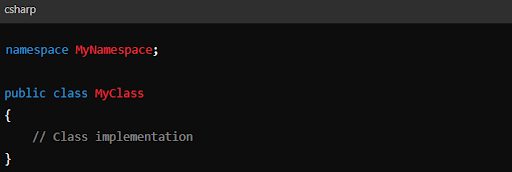Exploring the New Features of C# 12.0: A Comprehensive Guide for Developers
Manish Kumawat
Last Updated on: 01 October 2025
With the release of C# 12.0 as part of .NET 8.0, the developer experience has been significantly enhanced with numerous new features and upgrades. The ability to express, power, and efficiency of C# have all improved with this latest release. However, what level of expertise you have with programming, these features will raise your output and improve the quality of your code.
C# has developed significantly over time, consistently adding new features that improve performance, safety, ability to express, and ease of use. Every iteration expands on the improvements made before, adding more features to keep up with the ever-changing requirements of contemporary software development.
C# 12.0 is available with the.NET 8.0 release, bringing with it many powerful new features that enhance the language's efficiency, security, and readability. Among the most important features are enhanced nullable reference types, which make reference types non-nullable by default to prevent null reference exceptions. Programmers can explicitly mark variables as nullable, making it easier to identify potential compilation issues.
C# 12.0 is the first major release designed specifically for .NET 8.0. Some functionalities require library types unique to .NET 8.0, while others depend on advanced features in the Common Language Runtime (CLR). Let's dive into some of the most notable features of C# 12.0 and see how they can benefit your development workflow.
- Enhanced Nullable Reference Types
One of the standout features in C# 12.0 is the enhanced nullable reference type. By making reference types non-nullable by default, this feature aims to prevent the notorious null reference exceptions, a common source of runtime errors. Developers can explicitly mark variables as nullable, which helps identify potential issues at compile-time, leading to more robust and reliable code.

- Improved Pattern Matching
Pattern matching has been significantly improved in C# 12.0, making it more powerful and expressive. The new features include:
- List Patterns:
This allows you to match against lists and arrays, enabling more intuitive and readable code for handling collections.
- Span Patterns:
Optimized for high-performance scenarios, span patterns allow pattern matching on spans and slices of data without additional allocations.
- Recursive Patterns:
These patterns make it easier to deconstruct and match nested data structures, streamlining complex data processing tasks
- List Patterns:
- Primary Constructors
C# 12.0 introduces primary constructors for classes and structs, simplifying the initialization process. With primary constructors, you can declare parameters directly in the class or struct declaration, reducing boilerplate code and enhancing readability.

- Interpolated String Handlers
Interpolated string handlers provide a more efficient way to work with string interpolation, particularly in performance-critical scenarios. This feature allows developers to create custom handlers that can optimize memory usage and improve the performance of string interpolation.
- Default Interface Methods
C# 12.0 extends support for default interface methods, allowing interfaces to include default implementations for methods. This facilitates the evolution of APIs by enabling developers to add new methods to interfaces without breaking existing implementations.

- Records Enhancements
Records, introduced in C# 9.0, receive further enhancements in C# 12.0. New features include:
- With-Expressions for Positional Records:
Allowing easy creation of modified copies of records.
- Value Equality Improvements:
Enhancing how value equality is handled, making records even more useful for immutable data structures.
- With-Expressions for Positional Records:
- Enhanced Asynchronous Streams
Asynchronous streams have been improved, providing more capabilities for processing data asynchronously. These enhancements make it easier to work with real-time data and implement reactive programming patterns.

- File-Scoped Namespaces
File-scoped namespaces are introduced to reduce indentation and simplify the organization of code. This feature allows you to declare the namespace for an entire file, streamlining the code structure.

- Source Generators and Incremental Generators
C# 12.0 continues to build on the power of source generators introduced in C# 9.0. Incremental generators provide more efficient code generation by minimizing the amount of work needed during the compilation process, leading to faster builds and more responsive development cycles.
- Enhanced Lambda Expressions
Lambda expressions in C# 12.0 has been enhanced with more capabilities, such as allowing attributes and natural types for lambdas. These improvements make lambdas more flexible and powerful, enabling more concise and expressive code.


Benefits of C# 12.0
- Enhanced Productivity:
- Primary Constructors for Classes: Simplifies class constructors, reducing boilerplate code and making classes easier to read and maintain.
- Collection Literals: Enables more concise and expressive syntax for initializing collections, improving code readability and reducing errors.
- Improved Code Readability:
- Pattern Matching Enhancements: Introduces new patterns and enhances existing ones, making conditional logic more clear and maintainable.
- Extended Inline Array Initializers: Provides more intuitive and readable ways to work with arrays, simplifying array initialization.
- Performance Improvements:
- Span
Enhancements: Improves memory handling capabilities, allowing for more efficient and faster code execution. - Optimized Interpolated Strings: Enhances performance and readability of string formatting, reducing the overhead of complex string operations.
- Span
- Modern and Expressive Syntax:
- New Language Features: Incorporates modern programming paradigms and syntax enhancements, keeping C# competitive with other languages.
- Default Interface Methods Enhancements: Expands capabilities for default implementations in interfaces, reducing the need for extensive boilerplate code.
- Better Maintainability:
- Source Generators Improvements: Enhances compile-time code generation, enabling more powerful and efficient code generation tools.
- Simplified API Design: Improved default interface methods and other features support more flexible and maintainable API designs.
- Increased Flexibility:
- Primary Constructors: Allow for more flexible and concise class design, especially in data-centric applications.
- Extended Collection Literals: Make it easier to work with complex data structures and collections, enhancing flexibility in code design.
- Community-Driven Enhancements:
- Incorporation of Feedback: Reflects improvements and features based on community feedback, addressing real-world developer needs and scenarios.
- Ongoing Modernization: Continuous updates ensure that C# evolves with the needs of developers and the tech industry.
- Seamless Integration:
- .NET Ecosystem Compatibility: Fully integrated with the latest .NET updates, ensuring seamless use within the broader .NET ecosystem.
- Tooling Support: Supported by updated tools and IDEs, providing a robust development environment.
Conclusion
C# 12.0 has features that enhance the language's capabilities and streamline development processes. These updates, from primary constructors for non-record classes to extended property patterns and collection expressions, are designed to make coding more intuitive and efficient. As you explore and integrate these features into your projects, you'll find that C# 12.0 continues to uphold its reputation as a powerful, versatile language for modern software development.
HIRE A TOP SOFTWARE DEVELOPMENT COMPANY

 Verified
Expert in Software & Web App Engineering
Verified
Expert in Software & Web App Engineering
I am Manish Kumawat, co-founder of Fulminous Software, a top leading customized software design and development company with a global presence in the USA, Australia, UK, and Europe. Over the last 10+ years, I am designing and developing web applications, e-commerce online stores, and software solutions custom tailored according to business industries needs. Being an experienced entrepreneur and research professional my main vision is to enlighten business owners, and worldwide audiences to provide in-depth IT sector knowledge with latest IT trends to grow businesses online.
Partner with Top-Notch Web Application Development Company!
Discuss your Custom Application Requirements on info@fulminoussoftware.com or call us on +1-903 488 7170.
15 Days Risk-Free TrialRecommended Articles


